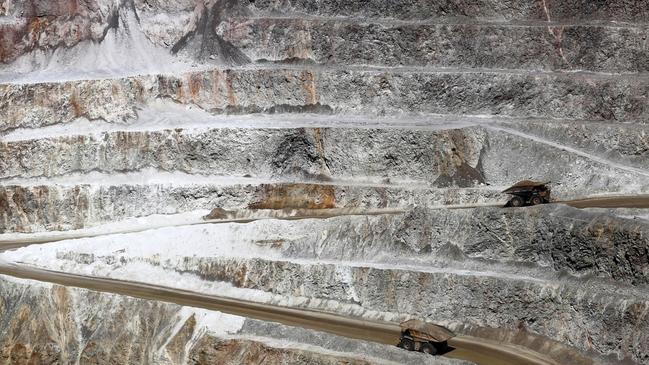Barrick Gold’s PNG stoush erupts after boss Mark Bristow ramps rhetoric over Porgera mine
The PNG government has flagged a push to take more control of Porgera gold mine as its stoush with Barrick Gold explodes.

Papua New Guinea Prime Minister James Marape has flagged a push to take more control of the Porgera gold mine in response to Barrick Gold boss Mark Bristow’s move to ramp up the pressure on the PNG government over the mine.
In a statement on Thursday night, Mr Marape said the PNG government would still welcome Barrick as a potential partner at the mine “but under new terms”.
“But first things first, the resource will be defined as belonging to the people that includes Land owners, the provincial government and the country,” Mr Marape said.
Mr Bristow ramped up the company’s rhetoric over the loss of its Porgera gold mine in Papua New Guinea this week, blasting the PNG government’s refusal to renew its lease in a letter to Mr Marape on Wednesday and restricting power supplies to communities around the mine on Thursday.
The PNG government refused to renew the mining licence at Porgera in April, putting in doubt the future of the multi-billion dollar mine, owned jointly by Barrick and China’s Zijin Mining, which is now sitting idle.
Barrick has challenged the decision in the PNG courts, and last week flagged taking the dispute to the World Bank’s International Centre for Settlement of Investment Disputes – where it last year won a $US5.8bn ruling against Pakistan’s government after a protracted dispute over control of the Reko Diq copper deposit.
Mr Marape said the PNG government had offered to buy Barrick’s stake in the mine, but had been stymied by the company’s decision to take legal action to win a renewal of its lease.
“To the land owners and employees and contractors, we have been ready to run the mine but the recent past lease holder in Barrick and their court cases has been the impediment. We will restore you all to better benefits you lost when we reopen the Porgera Gold mine,” he said.
“Look at OK Tedi mines ownership structure, the one third, two thirds equity/ownership principle is the starting base in which national government will talk with the province and landowners.”
On Thursday the PNG company that operates the mine said the lack of revenue from the mine meant it would be forced to restrict local power supplies, formerly delivered free to local communities, to 12 hours of supply a day. The company said it would “do its utmost” to maintain 24 hour power to the local hospital.
In a letter sent on Wednesday, seen by The Australian, the Barrick boss described the decision to strip Barrick and partner Zijin Mining of Porgera as “precisely the opposite of legitimate government process”, and told Mr Marape the action in the World Bank’s ICSID would damage the country’s international reputation if it did not negotiate a settlement.
“PNG’s reaction to the conciliation process will be scrutinised widely and you will be choosing whether to cast the country in a positive or negative light to international bodies,” he said.
In the letter Mr Bristow referenced a heated text exchange between Mr Marape and Ilua Temu, executive director of the joint venture, saying he was “stunned” at Mr Marape’s apparent lack of concern over the future of Porgera.
“It was your decision – reached unilaterally and without even a gesture of consultation or transparency with key Porgeran stakeholders – that forced the suspension of mine operations and the dire situation faced by laid-off employees, contractors threatened by bankruptcy, and a community that has relied for years on the mine for critical services in the absence of a functioning government in the Valley,” he said.
“I was stunned, therefore, to read your message to Dr Temu saying ‘the country will live on with or without Porgera’.”
The letter says Barrick has offered an improved “economic sharing” deal in return for a renewal of the mining licence, including an improvement on the 15 per cent stake in the mine already on offer and a total package that would deliver 58 per cent of the “overall economic benefits” of the mine to PNG, or about $US4.5bn over 20 years.





To join the conversation, please log in. Don't have an account? Register
Join the conversation, you are commenting as Logout